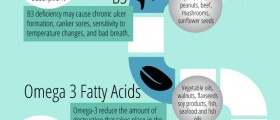
Vitamin D is one of the fat-soluble vitamins necessary for our body. Some even call it “the sunshine vitamin”, because our skin needs some sun light in order to synthesize this vitamin in the skin. About 10 minutes of sunshine everyday will provide plenty of vitamin D for the body. This vitamin is available in two forms, as vitamin D2 (ergocalciferol ) or vitamin D3 (cholecalciferol). In the blood, vitamin D is converted to calcidiol and then to an active form known as calcitriol (in the kidneys or by macrophages).
Human bodys need approximately 600 IU (International Units) every day. Children younger than one year need about 400 IU and pregnant or breastfeeding mothers should take in about 600 IU as well. Elderly people are advised to take more vitamin D every day, because their needs are about 800 IU.
Lack of Vitamin D
Insufficient dietary intake, problems with absorption of vitamin D or insufficient amount of sunlight exposure can lead to vitamin D deficiency. This condition is more common for older people, whose needs are higher, compared to those younger.Vitamin D Toxicity
Some people might experience health problems related to the overuse of vitamin D supplements, while it’s very unlikely to experience toxicity after the intake of vitamin D rich food. It can be just one single dose or use of several smaller doses of vitamin D taken over some time that caused vitamin D toxicity. Most common symptoms of vitamin D toxicity usually include: constipation and diarrhea, decreased appetite, dehydration, tiredness and irritability.Alternate periods of constipation and diarrhea are frequent in people suffering from vitamin D toxicity. These patients might also experience, a frequent urge to urinate, thirst, tiredness, itching, weakness and nervousness. They could easily dehydrate, because of the decreased need to drink water and other fluids.
Hypercalcemia is also very common among patients experiencing toxic effects of vitamin D. There is some evidence of a heightened level of calcium in their blood, and this effect is causing further toxic symptoms. Gastrointestinal problems, such as diarrhea and constipation, nauseous feeling, vomiting or anorexia are all provoked by high level of blood calcium.
Vitamin D overdose may also cause patients to complain about: constant headaches, drowsiness, muscle joint and bone pains, and heartbeat problems.
Toxicity of vitamin D is associated with kidney problems like kidney stones and urinary casts, elevated level of calcium in urine or proteins in the blood. Sometimes, vitamin D toxicity can increase the risk of ischemic heart disease, or it can also be the attributing factor to high blood pressure or kidney failure.
















Your thoughts on this
Loading...